- Home
- James Luceno
Memories End Page 8
Memories End Read online
Page 8
“Here's another 'stute thing, Jolly Gray Giant. If you're going to see the Boruans, that means you have money to spend—a bunch of which you're going to turn over to us or suffer the penalty.”
Tech was not unaccustomed to such talk, although the four Deceps positioned around him were not the sort he was used to fighting and occasionally being pummeled by. He and Marz had grown up among a more educated class of bullies who were often popular in school and skilled at football or baseball. The ones who looked as if they might end up gangbangers tended not to bother with them, sensing perhaps that Tech and Marz were just as fringe as they were and knowing full well that they weren't potential competition for the high-school title of Most Feared, Most Contemptible, or Most Likely to End up Incarcerated.
On many a Network combat site, Tech and Marz were the equivalent of martial arts masters, but virtual skills didn't always translate well to real life. Since being moved to the city, they had gotten in several fights with older kids at Safehaven who made it a habit to torment the group home's younger and often smaller members, including Marz.
It was one such fight—believed by Fidelia Temper to have been instigated by Tech—that had opened a gulf between the Vega brothers and Fidelia. But the short-lived brawl had also had the more surprising result of turning Tech and Marz into heroes in the eyes of some of Safehaven's meeker residents.
Unfortunately, their reputation at the group home wasn't likely to carry much weight among the Deceps who, at the moment, appeared more eager to dish out a beating than collect a toll. The leader, in particular, was eyeing Tech in a manner that was unnerving for the calm behind it.
Tech was preparing to defend himself and Marz when the hooting, caterwauling sounds of an approaching police vehicle filled the alley. The Deceps glanced at one another and began to back away.
“Next time, geek,” the leader snarled, pointing to Tech before he spun on his heel and ran off with his friends.
“Back at you, powerpuff.”
The stuttering siren sounds grew louder, but there was still no sign of the police vehicle itself. Then from a narrow side alley appeared a teenage girl wearing a boom-box vest cranked to its highest volume.
“Hurry!” she yelled. “Rado's slow-witted, but he won't be fooled for long.”
Harwood put his hands on his hips and laughed. “In the nick of time, a beautiful princess warrior with the voice of a siren appears on the scene. She bids you accompany her to safety, and you do.”
Tech, Marz, and Harwood followed their rescuer through a series of graffiti-adorned twists and turns that ultimately delivered them to a busy cross street. It was only then that the girl silenced her speaker-heavy sonic vest.
“Only the second chance I've had to use it,” she said, smiling proudly. “What do you think?”
“Marvelous,” Harwood said. “Truly inspired.”
Tech tried to study the girl without being obvious about it. Five-seven, she was maybe fifteen or sixteen with ice-blue eyes, freckles, and a shock of flaming-red hair that fell in loops and curls well below her shoulders. Her outfit of shorts, ankle-high boots, and sonic vest looked expensive and fit her perfectly.
“Isis Whitehawk,” she said, extending her hand to Harwood.
“Isis, permit me to thank you for your timely intervention in our behalf,” Harwood said. Gesturing toward Tech and Marz, he introduced them to her.
Isis nodded, then glanced back into the alley. “The Deceps aren't all bad, but Rado is just plain mean. Where were you guys headed before he decided to run his little tollbooth number on you?”
“Hackers’ Outlet,” Tech said.
“I'll take you. I'm pretty tight with the Boruans.”
“Why is that?” Harwood asked mildly.
“Mainly 'cause I sort of speak their language. I grew up in Singapore, Japan, and Indonesia.”
“Interesting. And do you do any Network flying—when you're not serving as an early-warning system, that is?”
She glanced at Harwood while they walked. “You mean the grid or just the rides?”
“The grid.”
“I know the Ribbon up and down—Foxy Music, the VRave, Ziggy's Cyberchop Shop, Sinema, the Opposite 7… I'm even better at flying than I am with my fists and feet.” Isis performed a lightning-fast combination of punches and kicks.
“What do you fly from,” Tech asked, “a VES 2000 or something?”
“A 2000?” Isis laughed, showing snow-white teeth. “I've flown everything from a 2000 to a water-cooled 2800.”
Tech and Marz traded surprised looks.
“With a standard or enhanced accelerator?” Marz asked.
“Take your pick. But I prefer the enhanced if I'm suited up in a Gravitan motion-capture vest. Just for the kinesthetics, you know.”
“A Gravitan,” Marz said enviously.
Tech hurried his pace to come alongside Isis. “Yeah, but do you ever do any serious flying? Any cyberj ockey stuff?”
She smiled slyly. “Are you talking about runs, infiltrations, that sort of thing?”
“Take your pick.”
“I've visited my share of off-the-beaten-track places,” she said.
“AmTel?” Marz asked.
“Mitsuni?” Tech said.
“The Plexus?”
Isis adopted an amused expression, and laughed. “What's with you two? It's like I've fallen in with charter members of the lost-clusters club. Run your tests on someone else. I'm not about to tell you where I've been just to prove a point.”
Harwood laughed, too, but in a different way. “Isis, I'm certain that Tech and Marz didn't intend their questions to sound challenging. I suspect they were merely trying to find some common ground. Right, Tech?”
“Well, yeah,” Tech said, red-faced.
Isis smiled. “In that case, we should take a flight together sometime.”
Tech nodded like a puppy. “Absolutely. Whenever.”
Harwood spread his long arms in contentment. “I always forget how much fun the city is.”
Chapter 9
Felix waited his turn to use the automated-teller machine. In the breast pocket of his jacket was the account number Gitana had given him written on the back of one of Felix's business cards.
He peered over the head of the person in front of him in line. The ATM could provide cash, though few people requested withdrawals nowadays, at least not since the advent of universal-credit codes. For a somewhat hefty fee, you could have your personal code implanted under your skin, like a locator, and never again have to use a plastic card. To obtain your credit code, cashiers or salespersons trained their scanners on your forearm, or wherever you had decided to have the implant installed. Or for those who preferred less body art, you could just charge to your cell phone.
When Felix's turn came, he caught a reflection of himself in the ATM's small display screen. Looking grim and troubled, he asked himself whether it had been the promise of additional money or Gitana's desperate tone of voice that had persuaded him to accept the assignment.
A little blackmail hadn't hurt, either.
Whatever the case, Gitana's distress at Felix's initial refusal to help had seemed thoroughly at odds with the dexterous, take-no-prisoners approach Gitana had taken in the Network. Added to Gitana's peculiar use of EPA and telephone-company slang, Felix could almost believe that he was working for two separate clients—or an individual with a multiple-personality disorder.
He tried to hide his concern from the ATM's surveillance cameras. In better days, the operation would have been a breeze. But with his business failing and Network Security keeping close tabs on him, even simple tasks loomed like challenges.
This was just a simple transferal, Felix told himself—though he didn't believe that for a moment.
The ATM could access monetary funds deposited in hundreds of banks, but this particular machine was owned by Global One, which had branches in almost every nation and nation-state in the world.
Felix inserted
his card and keyed in his passcode.
In an effort to reduce the amount of identification numbers a person had to memorize—for banking, purchasing, driving, traveling abroad, collecting social security, or making phone calls— the federal government had considered issuing single-identity numbers to each individual. But with the world's population continuing to spiral out of control, the effort had been abandoned.
It was the sheer overabundance of identification and account numbers that had given rise to occupations like data detective, for invariably someone would enter an incorrect digit, a personal number would be stolen, or some machine—glitched, virused, confused, overloaded, or crashed—would make a mistake.
Even the handful of artificial intelligences that served as information consultants for the world's major corporations were, for all their complexity, little more than calculators with personalities. But AIs—and their near cousins, neural nets—were improving all the time, and Felix figured that before too long artificial intelligences would be running for public office, offering movie criticism, and writing novels.
The Global One ATM displayed its menu.
Felix keyed “transfer,” then “transfer from an outside account.” When the machine asked for the number of the outside account, Felix slid the business card from his pocket and entered Gitana's account number.
Despite the knot in his stomach and his fears that the machine would begin to shriek like a slot machine or hoot like a siren, nothing unusual happened.
A message flashed on-screen confirming that the transaction had been completed, and the ATM spit out a printed receipt.
Scratching his head in perplexity, Felix stepped aside to permit the next customer access to the ATM. But he continued to watch from a discreet distance, if only to make certain that the machine didn't explode.
It was still functioning normally. The man who had stood behind him in line transacted his business and walked away.
Again, nothing unusual happened.
Felix breathed a sign of relief, walked briskly to the elevator, and rode it up to his floor. His office felt like a sanctuary. But he had no sooner sat down and put his feet up on the desk when the phone rang. He thought that it must be Gitana, but in fact it was the office phone that had rung, rather than Felix's private videophone line.
“Felix McTurk, Data Discoveries,” he said toward the phone's microphone.
“Thank goodness,” a woman said in an agitated voice. “Mr. McTurk, I hope you'll be able to help me. I just went to transfer money from my bank account and the machine told me that my account was empty. I—”
The phone's second line rang.
“Can I put you on hold for a minute?” Felix said.
“Yes, but please get right back to me. I'm desperate.”
Felix hit the second-line key. “Felix McTurk, Data Discoveries.”
“Mr. McTurk, I got your number from Frankie Blumen,” a man began. “I hope you're not too overwhelmed to take a priority case, because I'm in real trouble here. My bank account has been wiped clean. I tried calling the central office, but I couldn't even get through.”
“Which bank?” Felix asked carefully.
“Global One.”
The phone's third line rang.
“Can I put you on hold?”
“If you must.”
Felix depressed the appropriate key. “Felix McTurk, Data Discoveries.”
“McTurk, my bank has totally swindled me!” a man said gruffly. “I'm sorry for raving, but I just heard from the bank that a down payment I made on a new house has disappeared, and the bank has no idea where it went.”
“Would that be Global One?”
“Yeah, Global One.”
“I have to put you on hold.”
The man muttered a curse.
Felix pressed the phone's mute button and sat back watching the phone light up like a Christmas tree. In minutes, all the lines were full.
Is this Gitana's way of feeding me clients, making me rich? Felix wondered. He wished with all his heart that that was the explanation, but he knew better.
Whatever Felix had just done at the ATM, it was suddenly clear that he had helped bring financial ruin to who knew how many thousands of Global One customers.
A cavernous place reeking of freshly caught fish, the Hackers’ Outlet featured rack after rack of metal shelving loaded with computer parts and software programs in dozens of formats, some of the stuff dating back twenty years and much of it unlabeled. The clientele was an oddball assortment of hardcore hackers, geeky loners, and engineer types sporting wristphones and portable-interface wardrobes. Huge bins located just inside the entrance contained everything from cut-rate processor chips to previously used data visors and Network Positioning System–equipped motion-capture vests.
Harwood strode right up to the sales counter and extended his hand to a bald brown man the size of a small mountain.
“Hello, Menem.”
Menem—the Boruan Tech who Marz knew only as Tsunami—squinted for a moment; then his face lit up in joyful surprise. “Myst'ry Notes! Where you been, man? We haven't see you since… well, too long, anyway.” He turned and shouted to a group of his fellow employees who were busy in the rear of the warehouse unloading a truck. “Hey, Poonja! You're not going to believe who just showed up!”
Suddenly Strange was surrounded by a dozen men shaking his hand and slapping his back in welcome, all wanting to get a look at a real-live ghost. Whatever Tech had been feeling about Harwood on the drive into the city, he suddenly felt honored to know the man. It didn't hurt that Isis was looking at Tech as if he could provide her with backstage passes to a DisArray concert.
“The Mystery Notes?” Isis whispered.
“Harwood Strange,” Tech said proudly before puzzlement erased his grin. “You've heard of him?”
“Well, of course, I've heard of him. I grew up hearing his name mentioned almost every day.”
Tech and Marz swapped confused looks. “But I thought—”
“What, that I was just some geekgirl who likes to roam the alleys wearing a sonic vest?” Isis interrupted.
“Not exactly,” Tech said. “But I didn't figure you for history-mad, either.”
Harwood must have overheard some of the exchange, because he excused himself from the group of swarthy men and ambled over.
“Boys, surely you recognize the name Whitehawk,” Harwood said.
“We do?” Tech said.
“The Whitehawk Processor. The Whitehawk Shunt. The Whitehawk Microdriver.” Harwood glanced at Isis. “Am I leaving anything out, Isis?”
“The Whitehawk Gravitan motion-capture vest.”
Tech and Marz were speechless for a moment.
“Your father is that Whitehawk?” Marz said at last.
“My uncle, actually,” Isis said. “But my dad's no slouch at the console, either.”
“He certainly isn't,” Harwood agreed. “Merlin Whitehawk is responsible for some of the finest cybersystems ever designed.”
“Jeez, no wonder you've flown from a VES 2800,” Marz said. “That was probably your starter system, right?”
Tech shook his head, as if to clear it. “I don't get it. What are you doing running with the Deceps when…?”
Isis’ blue eyes narrowed. “When I should be uptown hanging with private-school friends? I could ask you the same, Tech. I mean, today's not some school holiday, and here you are at the Hackers’ Outlet with Harwood Strange, of all people.”
Tech glared.
Isis blinked her baby blues. “The fact is, I live down here. My dad's something of a privacy nut, and he loves that the Deceps keep disabling the surveillance cams.”
Before Tech or Marz could reply, Harwood intervened.
“Marz, why don't you hunt around in the discount bins for the hardware we're going to need to repair Felix's cybersystem. In the meantime, Tech and I will see about procuring the soft.”
“I'm on it,” Marz said.
Harwood
smiled and led Tech and Isis back to Menem.
“Tech, here,” Harwood said to the Boruan, “is my protégé.”
Tech's mouth fell open. Isis’ finger closed it for him.
“He and I are going to be doing some flying, and we were wondering if you might have anything special to suit our needs?”
Isis elbowed Tech in the ribs and smiled approvingly when he glanced at her, his eyes blinking rapidly at Harwood's declaration.
“Good timing as always. A lot of interesting stuff has just come in,” Menem said in a conspiratorial voice. “I'm sure I can you hook you up.”
Harwood grinned. “Splendid. Do you have any copies of a certain ghost program Tech obtained from you a couple of days ago?”
“Subterfuge, wasn't it?” Menem said looking at Tech.
Tech nodded.
“All gone,” Menem apologized. “Very, very popular.”
Harwood stroked his beard. “Do you happen to know where that particular program originated?”
Menem glanced around, then lowered his voice to say, “It was a Mach Two release, Myst'ry. But word has it PE has been test marketing a lot of programs on the sly using Mach Two as a front.”
“Peerless Engineering,” Harwood said with great interest and a meaningful glance at Tech. “Do you have anything else from Mach Two?”
Menem disappeared from the counter. Isis looked from Harwood to Tech and back again, but kept to herself whatever questions she wanted to ask. A moment later, Menem returned with two minidisks nested in plain, hemp-paper envelopes.
“Blueprint and Skeleton Key,” he said, setting the respective disks on the countertop.
Tech repeated the titles, frowning in disdain. “Those sound like gamer soft.”
“Blueprint is a detailed map of the southern Ribbon,” Menem said quietly. “Skeleton Key will open many a locked door.”
Harwood studied the disks for a moment, then said, “We'll take both.”
Menem smiled, then prized a third disk from the breast pocket of his tropical shirt and slid it forward. “This one's on the house, Myst'ry.” He winked.
Harwood regarded it and grinned. “You dog! Turbo 7.5. Last version I had was, what, 3.1?”

 Darth Plagueis
Darth Plagueis Memories End
Memories End Star Wars: Dark Lord: The Rise of Darth Vader
Star Wars: Dark Lord: The Rise of Darth Vader Star Wars Darth Maul: Saboteur
Star Wars Darth Maul: Saboteur Star Wars: Millennium Falcon
Star Wars: Millennium Falcon Jedi Eclipse
Jedi Eclipse Star Wars The New Jedi Order - Agents of Chaos II - Jedi Eclipse - Book 5
Star Wars The New Jedi Order - Agents of Chaos II - Jedi Eclipse - Book 5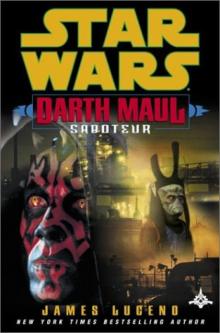 Star Wars - Darth Maul - Saboteur
Star Wars - Darth Maul - Saboteur Star Wars: Cloak of Deception
Star Wars: Cloak of Deception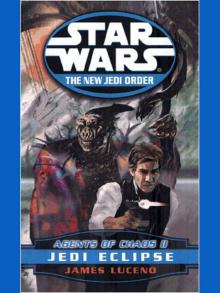 Star Wars: New Jedi Order: Agents of Chaos II: Jedi Eclipse
Star Wars: New Jedi Order: Agents of Chaos II: Jedi Eclipse End Game
End Game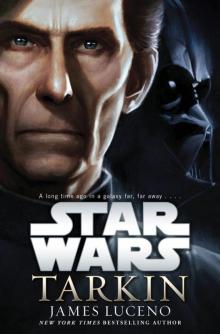 Tarkin: Star Wars
Tarkin: Star Wars Restraint
Restraint Star Wars - Cloak Of Deception
Star Wars - Cloak Of Deception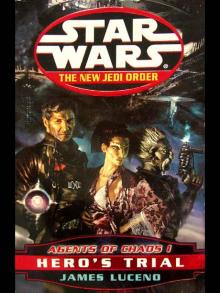 Star Wars: New Jedi Order: Agents of Chaos I: Hero's Trial
Star Wars: New Jedi Order: Agents of Chaos I: Hero's Trial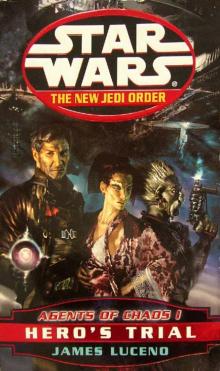 Star Wars The New Jedi Order - Hero's Trial - Book 4
Star Wars The New Jedi Order - Hero's Trial - Book 4 The Essential Novels
The Essential Novels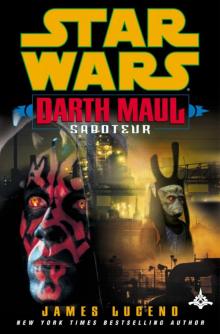 Darth Maul: Saboteur
Darth Maul: Saboteur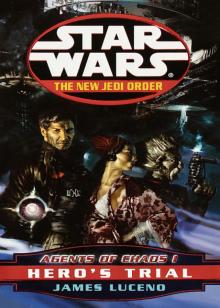 Hero's Trial: Agents of Chaos I
Hero's Trial: Agents of Chaos I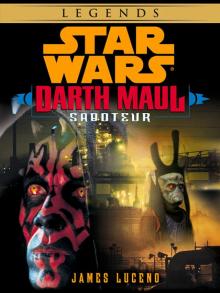 Saboteur
Saboteur The Unifying Force
The Unifying Force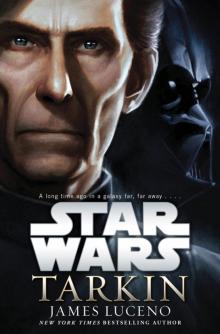 Tarkin
Tarkin Dark Lord : The Rise of Darth Vader
Dark Lord : The Rise of Darth Vader Catalyst
Catalyst Book 0 - The Dark Lord Trilogy
Book 0 - The Dark Lord Trilogy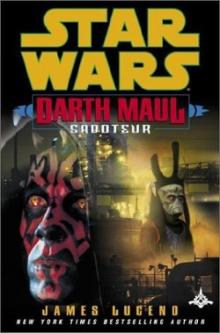 Darth Maul: Saboteur (star wars)
Darth Maul: Saboteur (star wars)